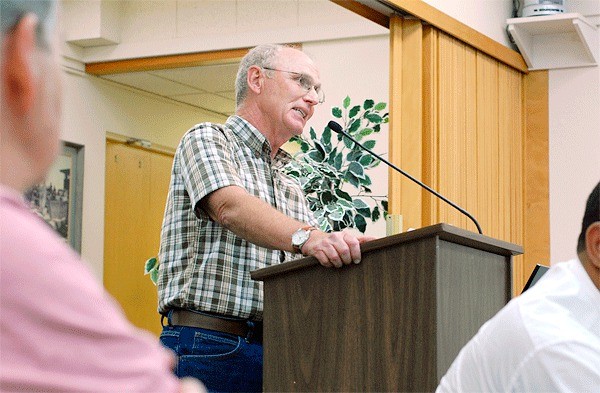Resident of an Oak Harbor waterfront neighborhood will once again have to wait to learn the future of their sewer system.
At their last meeting, June 28, Oak Harbor City Council members agreed for the third time in as many months that they will need more information if they are going to green-light Driftwood Beach Addition’s request to form an improvement district.
The council voted unanimously to address the issue in phases. First, city staff will seek out qualified firms to assess and establish the special benefit a gravity-fed and grinder-pump sewer system would provide. Once complete, the council may then authorize a request for bids and eventually sign a contract.
It’s hoped the results will reveal which system is the better fit for community, which was formerly known as Dillards Addition. Council members also hope it will ease tensions between suspicious property owners and city staff.
“That’s the starting point for me to get us off this rock and get started,” said City Councilman Rick Almberg, who made the motion.
Controversy over the neighborhood’s sewer system has been ongoing for years. The complicated issue revolves around differing technologies that could be installed to service the approximately 30 homes in the community and how it will be paid for.
Most Driftwood residents signed a petition earlier this year to create an improvement district — a funding mechanism for community infrastructure projects — to pay for a gravity-fed system. But it’s a process encumbered with state regulations and council members asked city staff in April to bring the issue back after further review.
They wanted a cost-benefit analysis of a gravity-fed system, but set an expenditure cap of $25,000. However, the issue was remanded again in May when council members once more sent the issue back to staff. This time they wanted a cost-benefit analysis of a low-pressure grinder pump system.
A financial breakdown for both systems, compiled by the city-hired engineering firm Gray & Osborne, was presented at the June council meeting. Neither estimate included the cost property owners will bear to construct side sewers and abandon their septic tanks.
Although the final costs may be debatable, the firm quoted the price of a low-pressure grinder pump system at $623,359 while a gravity-fed system would run just over $1 million.
Several Driftwood homeowners who spoke at Tuesday’s meeting said the analysis was incomplete because it didn’t show what the overall cost-benefit would be to the entire sewer basin.
“To me this is the biggest part of the puzzle,” Duane Dillard said.
Improvement district laws don’t allow the assessment to be greater than the increase in value the improvement would provide. For example, if Driftwood residents each had to pay $10,000 for a new system, but their home values only increased by $5,000, the improvement district could not move forward.
Gray & Osborne’s estimates were also a source of criticism. The city hired the same firm several years ago and many Driftwood homeowners distrusted their findings, along with the conclusions of city staff. Several expressed dismay that the city is once again relying on the same source of information.
“It’s really frustrating,” Marc Goetz said.
One source of contention is that the latest estimates don’t include the vacant city-owned property just north of the neighborhood. It’s important because, if developed, it would dilute the cost of either system among a larger number of property owners.
City staff argued the land in question is a wetland and not developable. But residents voiced doubt, saying its true condition is debatable. They claim conflicting city documents outline it as a potential relocation site for the RV park.
Driftwood residents’ animosity and distrust of city staff was overwhelmingly evident. Several even claimed they had been lied to and were angry that the same people are still working on the project. The accusations prompted Mayor Jim Slowik to step in and defend city staff.
“I have to tell you we do trust city staff and we do use city staff to do this work,” Slowik said.
While it’s hoped that hiring another independent consulting firm will settle some of the more complicated legal questions, such as establishing special benefit, it’s unclear whether it can be done within the council’s imposed $25,000 limit.
City Administrator Paul Schmidt said the council may need to increase the amount in order to hire the firm or include it in the final cost of the improvement district. He could not say when the issue will be back to the council for approval.



